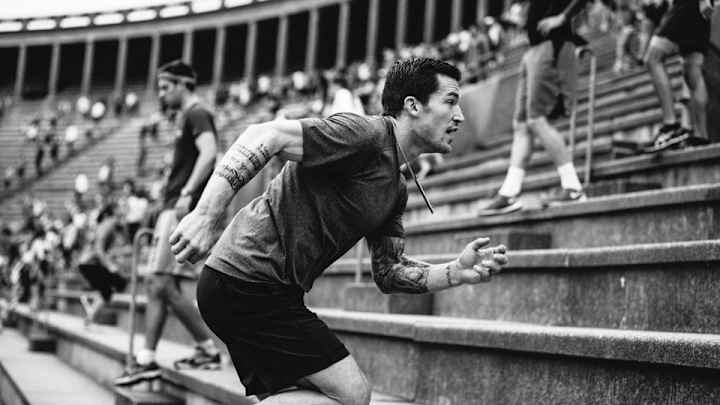On the Road: How Edmonton's Andrew Ference handles NHL travel

The worst kind of road trip for Edmonton Oilers captain Andrew Ference sounds a lot like anyone’s last choice of destinations: a really hot and really cold city in the same adventure.
"Packing is a nightmare," he tells Edge. "I hate packing a huge winter parka and then short sleeves at the same time."
That makes sense, though, since Ference says nutrition plays a key role in filling his suitcase—and his time—when on the road in the NHL.
And whether packing food, clothes or his studies—Ference is taking a farm-to-fork food course from Harvard at the moment—the veteran NHL player knows the focus on the way he travels has evolved greatly over his decade-plus in the league.
"I can’t even remember what I did [10 years ago]," he says. "I followed whatever the older guys were doing." And that wasn’t always the best, whether in terms of physical fitness, nutrition or even mental readiness. Now Ference puts a focus on each of those aspects.
"I probably have a quarter of my suitcase dedicated to food," he says. "I am being self-sufficient in that way, packing the things that are difficult to find or that the team won’t provide.”
restaurant system, a trick he’s used for years. “It is my golden tool on the road," he says. "I am able to find so many great smaller restaurants."
He eats organic and local in Edmonton, so he tries to do that on the road. "Guys get in the groove of hitting up the steakhouse every time and that isn’t the healthiest to eat for 10 days in a row,” he says. “I’m getting the good local, high-quality restaurants."
That may work well late in the day, but Ference brought to Edmonton a Boston Bruins tradition for the mornings. On the road, the team has the hotel set up a buffet on gameday with fruit and healthy choices, making it a requirement for the team to come down. "It is amazing how many guys will skip breakfast on gamedays," he says. "Sometimes a little hand holding has to be done."
SI.com's 2014-15 NHL Season First Quarter Awards
spends his time exploring cities, whether a museum or sites around town—spending time away from teammates, of course—for a balance.
"That is the thing I’ve learned from the best players I’ve played with," he says. "Rarely do they only have hockey in their lives. Having an escape and interest helps them be better players."
For this season, taking a course from Harvard has let homework fill some of that time and give him food for thought when it comes to planning nutrition and restaurant visits.
And while the way Ference thinks about health has evolved, the way he actually travels has too. It wasn’t until the latest collective bargaining agreement that NHL players were able to get out of having a roommate. Things like that help Ference get his gameday nap in easily and limited to 20 minutes, no longer doing "ridiculous stuff" such as a two-hour nap on the day of a game.
"I was seeing other guys that were doing it different ways and having such success," Ference says. "You watch guys have long careers doing it different. Long career guys have taken extremely good care of themselves by not just going with the herd."
When it comes to working out on the road, Ference likes to mix it up, getting in at least something, whether a little run, a stretch, yoga in the hotel gym or even situps and pushups in the hotel room.
A recent road trip through Philadelphia, Boston, New York and Nashville had Ference landing in Philly and doing a body-weight workout, meeting up with friends in Boston for a November Project workout, a run through Central Park in New York and a walk in Nashville. "The worst thing you can do is hours upon hours of sitting in a hotel room or laying in bed," he says.
And that is why packing can get tough, especially with not knowing what your body, injuries and time will allow you to do. One thing that has made trips easier to pack for, though, is the NHL’s relaxed policy on wearing a suit when traveling.
"Before, you’d pack one suit and three dress shirts through a 10-day trip, but now I’m packing casual clothes, comfy clothes, workout clothes,” he says. “I have like a 60-pound bag full of casual and comfort clothes and food."
For Ference, he says the shift away from rigid clothes has made life easier, especially with the ability to choose the products he wants to wear. As a brand ambassador for lululemon’s men’s line, he sees a shift toward a different type of clothing in the league.
"[Lululemon] is pretty great for a lot of us hockey players," he says. "You have noticed it over the last few years, how many guys throw on their stuff. You are supposed to be business casual for the airplane. Comfort comes at a pretty high priority, so making sure to pack comfortable business casual is an important thing."
Just don’t ask Ference to pack a parka and short sleeves for the same trip.
Tim Newcomb covers stadiums, design and gear for Sports Illustrated. Follow him on Twitter at @tdnewcomb.

Based in the Pacific Northwest, Tim Newcomb covers stadiums, sneakers, design, training and technology across all sports.